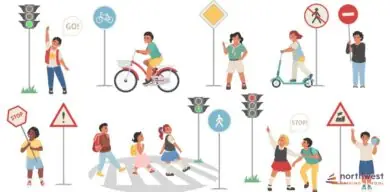- Traffic School
How Many Points On Your License Is A Lot?

How many points can end up on your license? Most of us have heard about “points” when driving a car, but do we understand what these points mean and why they exist? The question often has drivers scratching their heads and searching for answers.
Unfortunately, if an excessive number of points are allowed to accumulate from repeated violations, a suspension or other severe penalties could result—so it pays to educate yourself on this vital subject!
In this post, we’ll review the basics so drivers know exactly how many points are too many when avoiding losing their license.
Table of Contents
- Different types of traffic violations that can lead to point accumulation
- Effects of having too many points on your driver’s license
- How long do points remain on your license and can they be taken off?
- Which states have the highest number of points before suspension or revocation
- Tips for avoiding point accumulation and driving safely
- Resources for drivers with multiple points on their license
Different types of traffic violations that can lead to point accumulation
Traffic violations can result in costly fines and lead to point accumulation on your driving record. Some common types of traffic violations that can contribute to this point system include speeding, running a red light or stop sign, failing to yield to pedestrians or other vehicles, and driving while under the influence of drugs or alcohol.
These points can severely affect your driving privileges and even your insurance rates. It’s crucial to follow traffic laws and regulations and to prioritize safety on the road to avoid point accumulation and keep yourself and others safe.
Read More: How many points does traffic school take off in Nevada?
Effects of having too many points on your driver’s license
Too many points on your driver’s license can severely affect your driving privileges and overall livelihood. Points are added to your license when you commit traffic offenses like speeding, reckless driving, or running a red light.
The more points you accumulate, the closer you get to a suspended or revoked license, depending on the state’s laws. In addition to losing your driving privileges, having a bad driving record can also lead to higher insurance premiums and difficulty securing jobs requiring a clean driving record.
Taking traffic violations seriously is crucial, and you should do all you can to avoid accumulating too many points on your license.
How long do points remain on your license and can they be taken off?
As a responsible driver, it is essential to understand the consequences of traffic violations. When you receive a ticket for a moving violation, points are added to your driving record. These points can have lasting effects on your license and insurance rates. The number of points assessed varies based on the severity of the offense.
Speeding tickets can result in two to four points, while more serious offenses like reckless driving can add up to six points. Points typically remain on your record for two to three years, depending on your state’s laws. However, it is possible to have points removed by completing a defensive driving course or waiting for them to expire naturally.
It’s important to note that some violations, like DUIs, may permanently suspend your license. As a driver, taking all necessary precautions to avoid receiving points on your driving record and maintaining a safe driving history is crucial.
Which states have the highest number of points before suspension or revocation
In the United States, safe driving is crucial for your well-being and a legal requirement for keeping your driver’s license. Each state has its own set of traffic laws and penalties, and in some states, accumulating too many points on your driving record can lead to suspension or revocation of your license. But which states have the highest number of points before suspension or revocation?
By exploring data from the National Highway Traffic Safety Administration, we can see that states like Massachusetts and New Jersey have high point thresholds before license suspension or revocation, while states like Arizona and California have lower thresholds.
Tips for avoiding point accumulation and driving safely
Driving safety is the top priority on the road, and avoiding accumulating points on your license is crucial. Speeding, running red lights, and reckless driving are some major causes of point accumulation. However, there are several tips that you can follow to drive safely and avoid points on your license.
These tips include obeying traffic laws and following speed limits, maintaining a safe distance from other vehicles, avoiding distractions like mobile phones, and never driving when tired or under the influence of drugs and alcohol.
By following these guidelines, you can ensure the safety of everyone on the road and avoid facing the legal consequences of point accumulation. Remember, driving is a privilege, and taking responsibility for your actions on the road is essential.
Resources for drivers with multiple points on their license
If you’re a driver with multiple points on your license, the good news is that you’re not alone. Many people have found themselves in similar circumstances, and resources are available to help you get back on track. Before you do anything else, take a deep breath and remind yourself that it’s not the end of the world.
You can take steps to reduce the points on your license, such as attending a traffic school or defensive driving course.
NWDS’s traffic school is an excellent resource for drivers with license point accumulation. The school offers courses that can help you reduce the points on your license and improve your driving skills. These courses cover defensive driving techniques, traffic laws, and safe driving practices.



